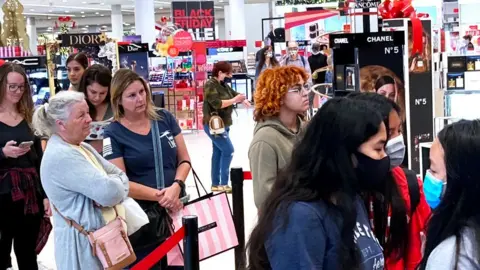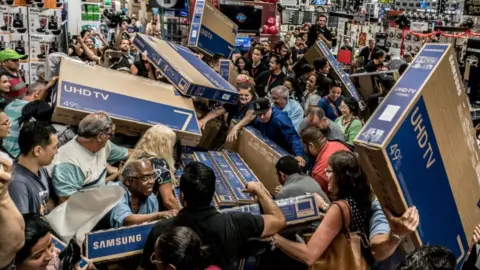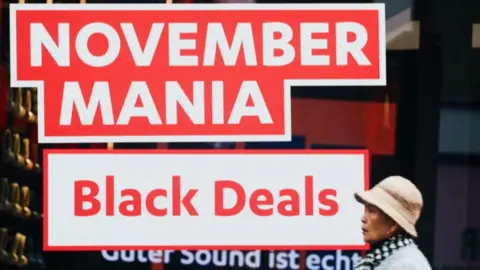Black Friday deals: Why bigger discounts may come next month
 Getty Images
Getty ImagesShoppers hoping to clinch lucrative deals on holiday gifts may get lucky during Black Friday sales this season. But those who wait may get even luckier.
Companies, worried about a repeat of last year's shortages, built up rich stocks of clothes, toys and other supplies ahead of the holidays.
Now they are knocking down prices, worried that they overestimated demand from buyers facing strains from the rising cost of living.
Sales events have already been running for weeks - and analysts say the discounts could get deeper as Christmas Day approaches, and firms face pressure to get goods off their shelves.
"What a world of difference," said Dana Telsey, chief executive of Telsey Advisory Group, a trading and consulting firm focused on the consumer sector.
"Last year there was not enough inventory and everything was selling at full price. This year there's too much inventory and there's a magnitude of promotions that will continue to increase as we get closer to Christmas.
"It's great news for consumers - if they have the money to spend."
Globally the mood heading into the holiday season is somewhat lacking in festive cheer.
 Getty Images
Getty ImagesA survey by consulting group BCG of nine countries, including the UK, Australia, France and Germany, found that the US was the only country where shoppers planned to spend more this year than last.
That aligns with gloomy forecasts from global retailers like Amazon, which has warned that holiday sales are likely to be weak, especially in its international business.
That is putting a damper on sales expectations - even in the US, where consumer spending - the main driver of the economy - has held up better than expected this year.
The US National Retail Federation expects sales in November and December to rise 6% to 8% compared to last year, similar to their outlook for the full year.
That's a sharp slowdown from 2021, when sales jumped more than 13% but still higher than the 10-year average.
But much of the sales growth in the US is expected to come from price increases, rather than an increased number of goods sold, said Neil Saunders, managing director at the GlobalData consultancy.
"A lot of warning signs are flashing in retail but the consumer has been pretty resilient. The question is how much longer will they be resilient for," he said. "That remains to be seen and I think that's why everyone in retail is holding their breath."
Black Friday, held the day after Thanksgiving when many people in the US have the day off, has traditionally jumpstarted holiday shopping, as retailers offer discounts to drive the biggest shopping day of the year.
 Getty Images
Getty ImagesThe sales event has spread globally in the last decade or so, advanced by US giants such as Apple, Amazon and Walmart and then adopted by local retailers in different countries in an effort to compete.
To buy or not to buy
Black Friday was once infamous for its crush of crowds, but it has seen its hold on the shopping season loosen in recent years as online discounts are applied earlier and earlier.
This year, many buyers have already made purchases, tempted by sales events that started as early as October.
The National Retail Federation still expects the number of shoppers this weekend to exceed the peak seen two years ago.
But the rise of early shopping raises the risk that buyer demand will drop off sharply in December, as the economy slows and rising prices for groceries and other essentials inhibit impulse purchasing.
If demand drops significantly, Mr Saunders said, even deeper discounts are likely to follow. Some retailers are already preparing for that possibility, with Target promising shoppers in October that the firm will refund the difference if it cuts the cost of an item closer to Christmas.
"This is a much more cautious Black Friday," Mr Saunders said. "That's a very big change compared to last year certainly, when people were throwing caution to the wind and treating themselves and indulging."
Despite the deals, consumers may still not be celebrating much, given the massive jumps in prices that have hit wallets over the last two years, said writer Catherine Brock, who has been blogging as the Budget Fashionista since 2014.

Though the inflation rate in the US has come down since June, prices are still rising - up 7.7% in the 12 months ended in October.
"Even though there are some great fashion and beauty deals out there, I don't know that it makes up for what's been going on with the groceries and the gas," she said.
"Being able to buy a sweater for my sister for Christmas for $20 instead of $30 - I think that helps a little bit, but I don't think it offsets it."


Do you look forward to Black Friday deals? How will they help you save money this year? Tell us by emailing: [email protected].
Please include a contact number if you are willing to speak to a BBC journalist. You can also get in touch in the following ways:
- WhatsApp: +44 7756 165803
- Or fill out the form below
- Please read our terms & conditions and privacy policy
If you are reading this page and can't see the form you will need to visit the mobile version of the BBC website to submit your question or comment or you can email us at [email protected]. Please include your name, age and location with any submission.

